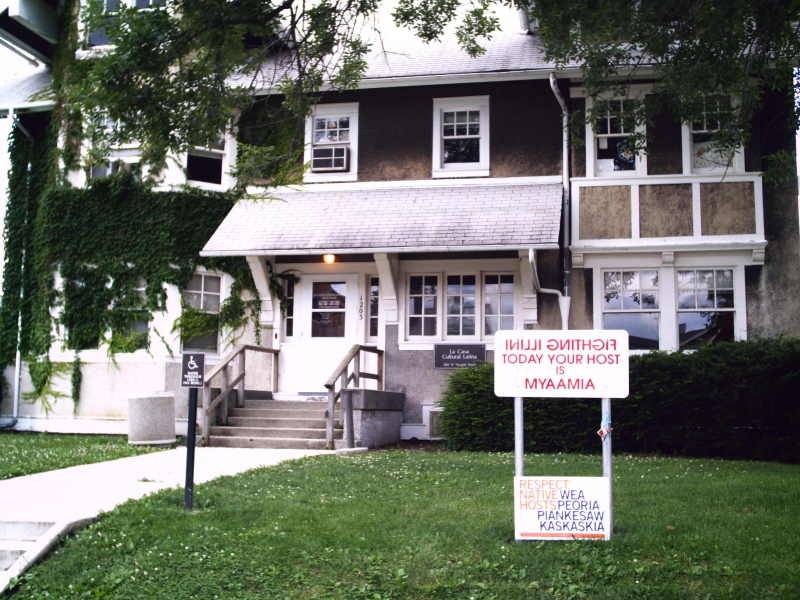 My esteemed libertarian colleague Rob McColley, in an otherwise fine column about cameras and Big Brother, felt the need to talk some smack about cultural houses. I have some real affection for Rob, as we share the same suspicion that people in power are a bunch of bozos. We also share a snarky sense of humor used in the service of making larger points. But I fear he went over the line yesterday.
My esteemed libertarian colleague Rob McColley, in an otherwise fine column about cameras and Big Brother, felt the need to talk some smack about cultural houses. I have some real affection for Rob, as we share the same suspicion that people in power are a bunch of bozos. We also share a snarky sense of humor used in the service of making larger points. But I fear he went over the line yesterday.
He was looking for video cameras near the scene of a recent crime, and referred to the University of Illinois cultural houses (such as La Casa Cultural Latina, the African American Cultural Center, the Native American House, etc) as “Race Row,” saying:
“This is a street of buildings designed to remind minorities that they’re different. It also helps them stay different, and reminds them of their inherent differences.”
The underlying message is that cultural houses aid in divisiveness. If only people didn’t acknowledge their differences, we’d all be the same.
But coming from a white person, this is inevitably interpreted (whether it is meant this way or not), as “if only those minorities weren’t so different, they’d be just like the rest of us white people.” It’s a way of blaming minorities for their historical exclusion from mainstream society.
I’ve noticed that whenever white people say “I don’t notice race,” or “I treat everyone the same” or “I think everyone should be treated the same,” what they are really saying is “I think everyone should be white,” or “I treat everyone as if they had grown up with the privileges and power of an average middle-class white person.” There’s often no recognition that the experience of being white in America is very different from the experience of being a minority.
One of the reasons races and cultures are not the same is that different races and cultures are treated differently by the mainstream culture. Growing up black or Asian or Latino or Native American means you’ve had different experiences because the majority white culture has treated you differently. Look no further than the case of Toto Kaiyewu, the black man shot and killed by police last spring, which all started because white people in Villa Grove were nervous about a black man stopped at a convenience store.
Another example: I’ve been mentoring a kid in Urbana for that last five years, who is now a sophomore at Urbana High School. This past school year, he was ticketed at 11:30 p.m. on a Saturday night, for literally crossing the street. The street was the 300 block of E. Eureka St, which if you follow the link, you’ll note is actually a dead-end with zero through traffic. So, essentially, he gets a $75 fine for being black and outside at 11:30 p.m. Imagine the stink if a white Centennial kid got ticketed for crossing the street in Cherry Hills or Ironwood. Or even Green Street or University Ave. for that matter.
But it’s not just small injustices that make the minority experience different. It’s that being a minority means that you must always carry your racial and cultural identities with you. It is how people in the majority culture see you, and it means you are constantly a representative of your race and culture. White people often complain when they have to “deal with” race on a regular basis. The irony is that one of the privileges of being white and in the majority is that you don’t really have to deal with race if you don’t want to. You can surround yourself with people who are like you, and not have to wonder whether people react negatively to you because of your skin color or culture. People of color almost never have that privilege in this country.
So, if you attend the University of Illinois as a person of color, and are tired of representing your race or culture to all the white people around you, it is good to take a break from it and be around people who understand you. If you are tired of having stereotypes constantly applied to you, it is good to be with people who share your culture and experiences. And one good way to do this is to go to a cultural house where your culture is celebrated and understood, rather than demeaned or ridiculed. It is quite the opposite of a place designed to remind you that you are different. It is a place of refuge designed to give you the energy you need to be a healthy member of society in a majority culture that is not your own.
One of the healthy things white people can do foster racial and cultural unity is seek to understand the experiences of those in cultural minorities. And the least we can do is let them enjoy the privilege of being around others who share their culture without telling them they aren’t white enough when they do this.








